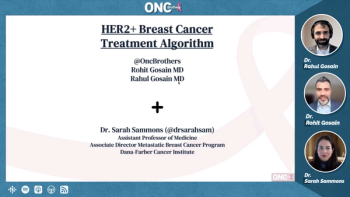
Oncology NEWS International
- Oncology NEWS International Vol 18 No 11
- Volume 18
- Issue 11
Women with small HER2+ breast ca face recurrence risk
Researchers in the U.S. and Italy report that women with HER2-positive breast cancers that are 1 cm or less in diameter and are node-negative have a risk of recurrence that is two to five times greater than that of women with HER2-negative breast cancers (J Clin Oncol online, November 2, 2009).
Researchers in the U.S. and Italy report that women with HER2-positive breast cancers that are 1 cm or less in diameter and are node-negative have a risk of recurrence that is two to five times greater than that of women with HER2-negative breast cancers (J Clin Oncol online, November 2, 2009).
Ana M. Gonzalez-Angulo, MD, and colleagues at Houston’s M.D. Anderson Cancer Center reviewed records from 965 women diagnosed between 1990 and 2002. They compared the rates of recurrence and metastasis among women with HER2-positive and HER2-negative breast cancers after a median follow-up of six years.
They found that five years after diagnosis, 77.1% of the HER2-positive patients were free of recurrence and 86.4% were free of metastasis, compared with 93.7% and 97.2% of the HER2-negative patients, respectively. Compared with women who had HER2-negative tumors, women with HER2-positive tumors were 2.68 times more likely to experience a recurrence and 5.3 times more likely to experience metastasis.
In the second study, Giuseppe Curigliano, MD, PhD, and co-authors from the Istituto Europeo di Oncologia in Milan found that women with HER2-positive node-negative breast tumors 1 cm or less in diameter have a 2.4-fold greater risk of recurrence compared to those with HER2-negative disease.
Additionally, women with HER2-positive tumors that also contained receptors for progesterone and/or estrogen had worse disease-free survival than women with hormone-receptor positive, HER2-negative tumors.
They reviewed records from 2,130 women of whom 7% had HER2-positive disease. Researchers examined the risk of recurrence and disease-free survival among women with both HER2-positive and HER2-negative disease, and further stratified patients according to hormone receptor status.
After a median follow-up of 4.6 years, they found that HER2-positive disease was associated with less favorable disease-free survival, regardless of hormone receptor status. Among women with hormone receptor positive disease, five-year disease-free survival was 92% for patients with HER2-positive tumors and 99% for patients with HER2-negative tumors.
The authors of both studies recommended that trastuzumab (Herceptin) should be considered for these patients. Jennifer Obel, MD, a member of the ASCO Cancer Communications Committee, agreed, commenting that trastuzumab is an effective targeted agent in women with these smaller tumors and should be discussed with patients.
Articles in this issue
about 16 years ago
Measure for measure: How to make practice benchmarks meaningfulabout 16 years ago
Ultrasound targets lymph node recurrence in breast cancerabout 16 years ago
JAMA article reignites debate over screeningabout 16 years ago
Moving at the speed of scienceNewsletter
Stay up to date on recent advances in the multidisciplinary approach to cancer.
































